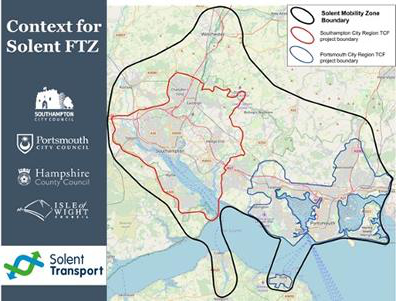The Solent FTZ is a multidisciplinary research and development project undertaken in collaboration with the University of Portsmouth and Solent Transport, comprising Southampton City Council, Portsmouth City Council, Isle of Wight Council, and Hampshire County Council. Theme 1 on passenger mobility is led by Professor John Preston and Theme 2 on Sustainable Urban Freight is led by Professor Tom Cherrett.
Under Theme 1 (Passenger Mobility), the University of Southampton is researching, developing and testing a Mobility as a Service (MaaS) App. This work is being undertaken in collaboration with the MaaS provider (Trafi) and their partners (Behavioural Insights Team (BIT) and Unicard). The work on MaaS will involve attitudinal surveys and stated preference experiments to investigate barriers and incentives to the uptake and use of the MaaS app and Human Factor methods in terms of benchmarking and iterative inclusive design.
Theme 1 will examine interventions that stimulate travel behaviour change to reduce private car usage, making travel journeys smarter and greener within the Solent sub-region. The University is also undertake monitoring and evaluation to assess the extent that the programme will change travel behaviour, reduce congestion, improve air quality, tackle climate change and transform the Solent sub-region into a better place to live and work. In addition to MaaS, this will include consideration of initiatives related to micromobility (e.g. e-scooters), dynamic demand responsive transport, bikeshare, lift-sharing, mobility credits and local mobility hubs. It will also examine the interactions between passenger and freight and the role of marketing and communications.
Under Theme 2, the University is examining the extent to which the concepts of macro-consolidation (through, for example, the development of sustainable freight centres and delivery plans) and micro-consolidation concepts (such as the use of (e-) cargo bikes and foot portering) can be developed. In addition, the role of aerial drones is being assessed, particularly with respect to the distribution of medical supplies on the Isle of Wight.
